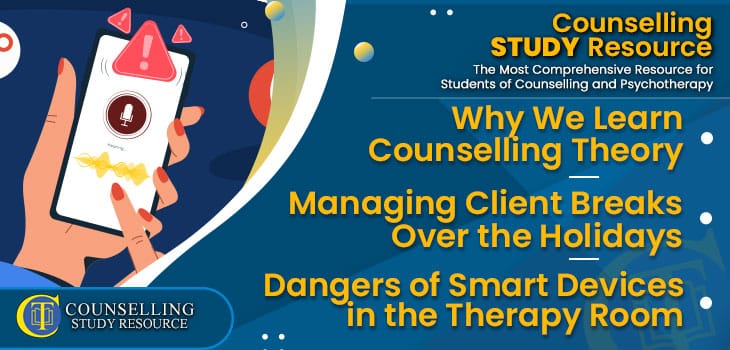284 – Dangers of Smart Devices in the Therapy Room
Why We Learn Counselling Theory – Managing Client Breaks Over the Holidays
In Episode 284 of the Counselling Tutor Podcast, your hosts Rory Lees-Oakes and Ken Kelly are back with this week’s three topics:
- Firstly in ‘Student Services’, Rory and Ken think about why we learn counselling theory.
- Then in ‘Ethical, Sustainable Practice’, we look at managing client breaks over the holidays.
- And lastly in ‘Practice Matters’, Rory speaks with Cath Knibbs about the dangers of having smart devices in the therapy room.
Why We Learn Counselling Theory [starts at 02:28 mins]
This segment of the Counselling Tutor Podcast is sponsored by
WebHealer.net
- WebHealer are the go-to provider of websites for private practitioners in the UK.
- Established over 20 years, WebHealer offers a non-technical and fully supported service to help therapists grow their private practice.
- Just one customer from your website each year pays for their service.
Go to WebHealer.net and use coupon CT100 for £100 off their "Do it for me" service.
If you’ve ever questioned the importance of learning counselling theory, look no further. In this section, Rory and Ken think about why we use theories in counselling, and why it’s key that you know them well:
- These theories are tried and tested, they won’t do harm.
- They have an agreed upon framework and have been peer reviewed.
- They stop things getting too personal e.g. urging the client to do something that worked for you personally.
- By knowing and understanding theory, you can know its limits and where it won't be effective.
- It’s important to find your learning style and use resources that compliment it.
- You can undergo your own personal development using theory.
- Talk about theories and explore them with your peers.
- When being taught theories, clarify and ask if there’s something you don’t quite understand.
- Within the therapy room, you won’t actively be applying the theories – unconscious competence.
- However, it can be useful to think about your theory after your sessions, linking it to the skills you employed.
Theory to Practice is sponsored by
Counselling Skills Academy
Learn counselling techniques by seeing counselling skills used in real sessions by qualified therapists.
Real sessions – real-life presentations – real skills.
Managing Client Breaks Over the Holidays [starts at 25:36 mins]
When running your own practice, it’s likely you’ll take time off over certain holidays. In this section, Rory and Ken discuss how you can prepare for these breaks away from your clients:
- It’s important that you’re taking this time for yourself.
- Do you have a business phone and a personal phone? Having a separate business phone means it can be turned off during a break.
- Put protocol in your contract and speak about it with your client.
- Have a discussion with your client well before the break – ask about their plans, what their frame of reference is towards the upcoming holiday. For some people, the holiday period can be really difficult.
- Map support for your high-risk clients – include these support phone numbers in your automatic voicemail and email responders.
- Discuss your plans and high-risk clients with your supervisor.
- The holidays can bring about unseen risks – not just for your high-risk clients.
Counselling Study Resource:
Assignment Guidance & Study Support for Counselling Students
- Academic Lecture Library - Lectures that cover key theory, skills and professional development linked to your counselling study.
- Assignment Guidance - Complete assignment exemplars and portfolios of work that have been passed by both tutors and awarding bodies.
- Theory Decoded, Skills Mastery and More - Counselling theories and skills are broken down into easy-to-understand ‘chunks’, with clear examples to guide you.
Dangers of Smart Devices in the Therapy Room [starts at 43:47 mins]
In this week’s ‘Practice Matters’, Rory is speaking with Cath Knibbs, a psychotherapist and behavioural technologist who studies technology’s impact on cognitive and emotional development. In this section of the podcast, Cath will be sharing insight into how technology can negatively impact clients – especially when it comes to data harvesting devices.
The key points of this discussion on the possible dangers of having smart devices in the therapy room include:
- We should consider removing technology from the room completely where possible.
- One of the dangers of having smart devices in the therapy room is these technology can put confidentiality at risk.
- Smart devices in the counselling space can also distract both the client and the counsellor.
- Devices such as Alexa, Google Home etc. are always on and always listening unless unplugged.
- Pay attention to terms and conditions.
- Data is constantly being collected and stored – do you know what happens with this data?
- Often this collected data is sold for advertising.
- Remove smart devices such as smart watches, phones, etc. from the therapy room when possible.
- Turn things off at the wall and unplug devices such as the Amazon Fire Stick.
- Discuss social media contact with clients – due to the physical proximity of your mobile phones, you might come up in the ‘people you might know’ section of their social media.
Get on-demand Certified CPD that is implementable in your practice
Counsellor CPD Library
- Over 150 hours of on-demand CPD lectures to help you stay current with your CPD ethical requirements
- Support, and be supported, by thousands of other counsellors as a member of the exclusive online community.
- Access your learning anytime you want ... anywhere you choose ... using any device type — desktop or mobile.

Free Handout Download
Importance of Theory in Counselling
